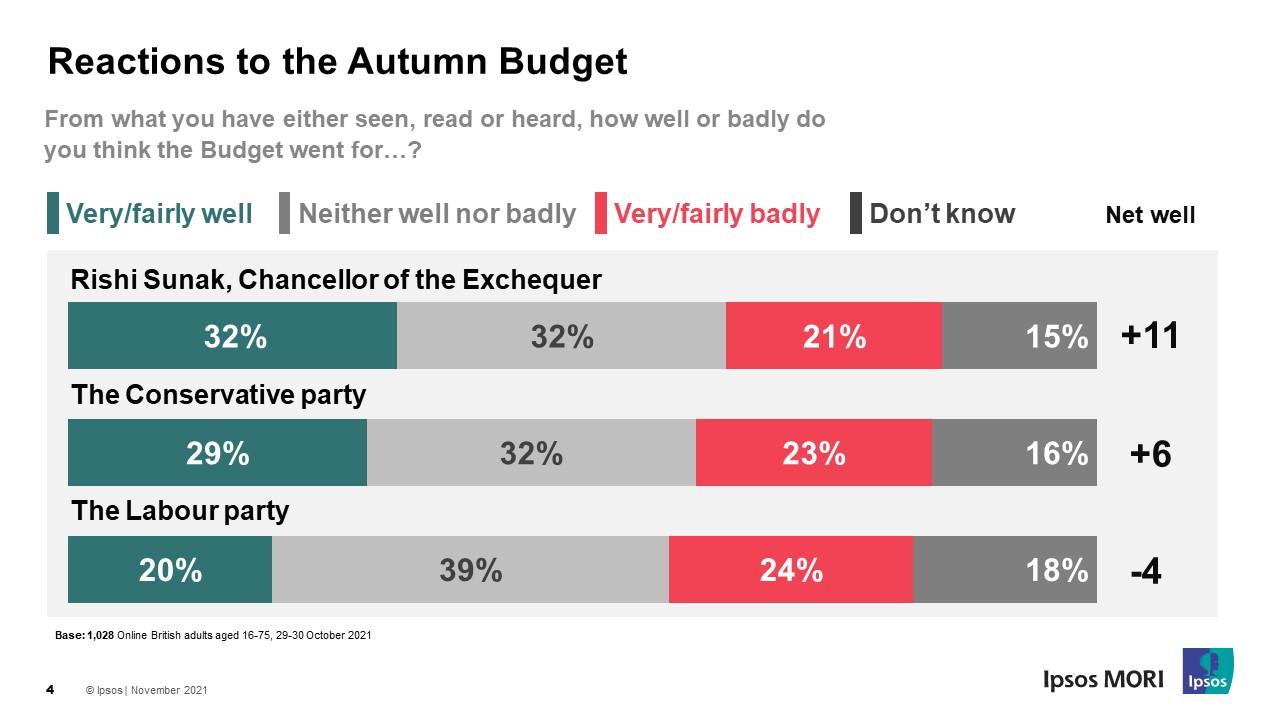Autumn Budget: What policies did Britons notice?
- Policies on minimum wage, alcohol & tobacco duty and universal credit most caught the public’s attention – but more couldn’t name any
- Although overall public thinks it will be better for high income earners than middle or low incomes
Ipsos’s latest online polling about Rishi Sunak’s recent Budget shows two in five think it will be a good thing for people on high incomes (38%), and a third that it will help big businesses (35%). On the other hand, a third or more believe it will have a negative impact on pensioners (34%) and people on middle (34%) or low incomes (39% - although 28% also believe it will be good for the least well-off).
Only one in eight (13%) report following news about the Budget “very closely”, although another two in five say “fairly closely” (41%). This leaves another two in five who followed it not very closely (30%) or not closely at all (13%).
When we ask those who followed the Budget to tell us in their own words what announcement most caught their attention the most common policies mentioned are the increase in minimum wage (12% of those who followed the Budget), cuts in alcohol and tobacco duty (9%) and changes to Universal Credit (8%). However, even these are only mentioned by a minority, with two in five (39%) saying they don’t know or nothing.

Overall, public opinion is divided on how the Budget went for Rishi Sunak with one in three (32%) thinking it went well for the Chancellor, whilst a fifth (21%) say badly and a third neutral (32%).
The Conservatives fare similarly with three in ten (29%) saying it went well for the party, and nearly one in four thinking poorly (23%). Whereas the Labour party performs less well with a fifth saying it went well (20%), compared to nearer a quarter (24%) believing it went badly. However, a larger proportion say it went neither well nor badly (39%) for Keir Starmer’s party.
 Elsewhere the public are also divided on the impact Budget announcements will have on regions in North England (24% say it will be a good thing vs. 25% a bad thing), young people (24% vs. 30%), small business owners (25% vs. 27%) and regions in South England (25% vs. 16%).
Elsewhere the public are also divided on the impact Budget announcements will have on regions in North England (24% say it will be a good thing vs. 25% a bad thing), young people (24% vs. 30%), small business owners (25% vs. 27%) and regions in South England (25% vs. 16%).
Looking forward, one in four (24%) believe Rishi Sunak will change Britain’s economy for the better (24%), whilst three in ten say he will make it worse (30%) and a similar proportion think he will make no difference (29%). Only a fifth (21%) think he has bettered country’s economy already (21%), whilst around three in ten say he has made it worse (31%) or no difference (33%).
Reflecting this, a third (32%) believe Britain’s economy will recover more slowly than those of most other countries as Coronavirus restrictions have been eased (up three percentage points since May 2020), and a similar proportion say it will recover at the same rate (-9pts). Only one in five (20%) say it will recover more quickly than most other economies, however, this is up from 13% in May 2020.
Gideon Skinner, Head of Political Research at Ipsos, said:
Of course the implications of the Budget go beyond the immediate reaction from public opinion, but nevertheless it is instructive to see what sticks in the public mind. Only half say they followed news about it fairly closely (although this is better than the attention paid to the recent party conferences), and even among those who claim they did many are unable to name a policy that stuck in their mind. However, the Chancellor may be pleased that the ones that did were about the minimum wage, alcohol and tobacco duty, and Universal Credit – but he has more of a task to convince the majority that he will be able deliver an economic recovery that benefits all sections of society.





